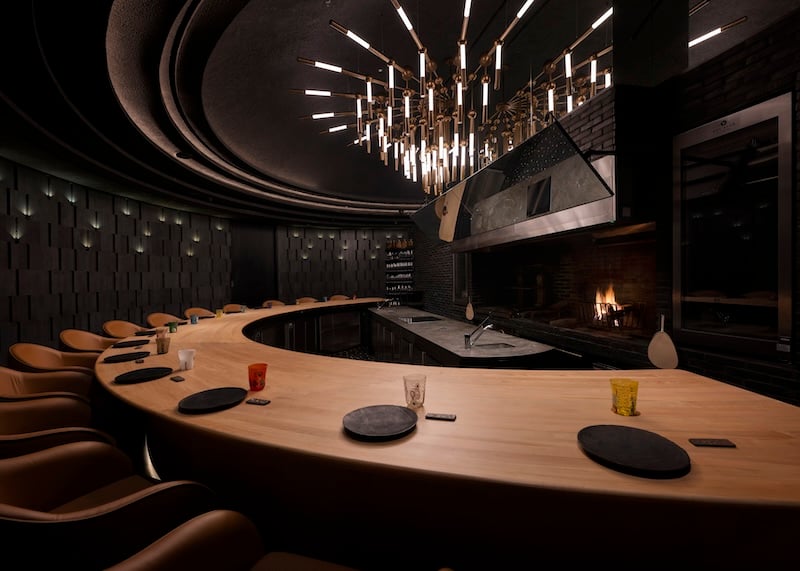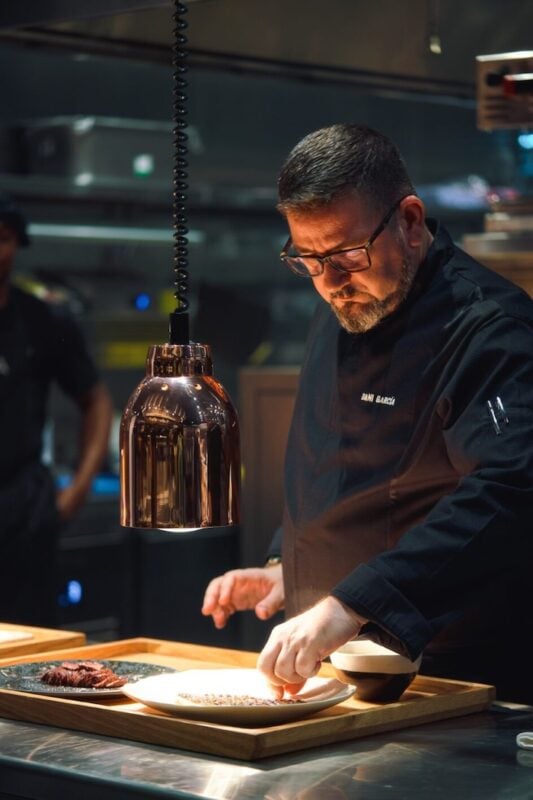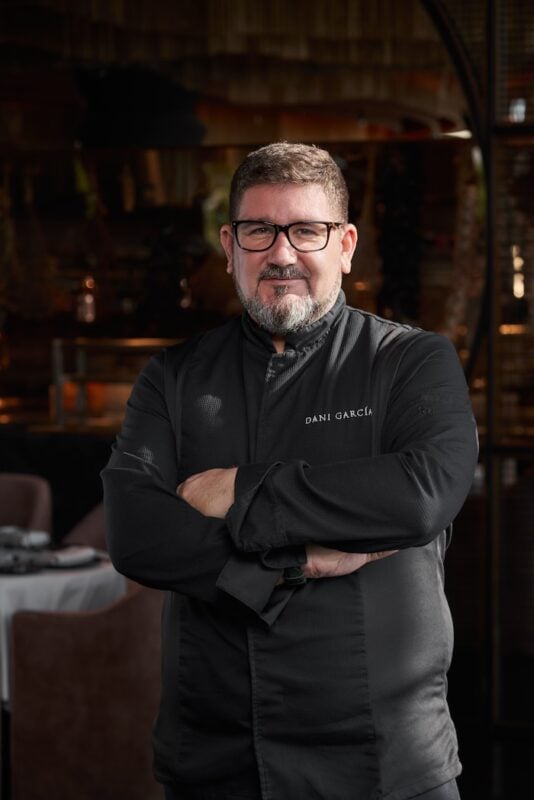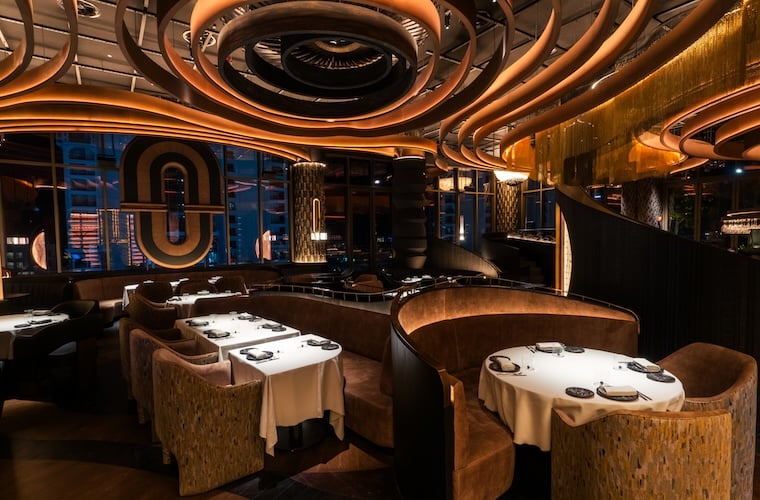Globally renowned for his culinary genius, Dani Garcia who hails from Andalusia brings his signature flair to Dubai with Leña and Smoked Room. His deep respect for tradition, combined with a bold approach to modern cuisine, has made these venues standout destinations for food enthusiasts.
Here, the renowned Spanish chef shares his culinary journey and the creative process behind his two dining concepts in Dubai that has earned him a star in the Michelin Guide.
Talk us through your daily routine, the first 30 minutes of the day.
I always wake up before the sun rises and open the window, because it appears right in front of my house. I play music on a record player I have and drink a coffee, sometimes vanilla and other times hazelnut. I sit down and read the news of the day. Those are always my first 30 minutes.
When did your love for food begin?
My love for food and the world of gastronomy really began very early, but the ones to blame were my mother, my grandmother and my father. My mother and grandmother cooked from Monday to Friday since my father worked. And I would go with my father early on Saturday morning to the market to buy fresh ingredients for cooking: clams, spider crab… anything that caught our eye… cuttlefish, cuttlefish broth, and things like that. Then on Sundays, we would usually go out to eat at a restaurant. It’s true that my family has always, not in a professional way, but has always lived closely with cooking and gastronomy. So, it was impossible for me not to love it. There were times when we would grind olives in a mill to have oil for the whole year at home, and we would also pick more olives to season them ourselves, snails… Honestly, all those activities we did at home revolved around gastronomy.
You’ve had an incredible career and have earned plenty of accomplishments. How did you get your start in the culinary space?
Well, once I finished my studies at high school, I didn’t want to go to university, and to be honest, gastronomy, hospitality in general, and restaurants… really caught my attention. Living in a place like Marbella, where a large part of our lives was tied to tourism, was the driving force behind it. It was a mix of both things— not wanting to continue my studies at a university and my interest in the gastronomic world around me. Suddenly, at that time, a brand new hospitality school opened in Málaga, and it was gaining a lot of fame. I went there to give it a try, and here I am years later.
As a highly accomplished Michelin-starred chef, is there pressure to constantly innovate revolutionary gastronomy concepts?
I did feel the pressure for a while, but that has also faded a bit. Not so much that pressure, but especially during the time when Spain broke through and became a leading force in the field of culinary innovation, etc. Nouvelle cuisine started to become a bit less important, and Spanish cuisine began to rise, thanks largely to the influence of chefs like Ferran Adrià. During that period, mainly from 1998 to around 2000–2015, those were truly years where there was much more creative pressure, especially in terms of creating new concepts and techniques that could contribute something. I think that’s what all the chefs of my generation opted for and, driven by Ferran, that’s what we did during that time. Then, of course, times have changed, and I believe there isn’t as much creativity as there used to be.

The culinary experience at the Leña/Smoked Room is exceptional. What is the recipe to this success in such a location?
They are two concepts that I love. I believe that in the end, the secret to success can be a good price-quality ratio. One way or another, the price and what you offer for it are vitally important. The restaurant’s interior design, the human team, the hospitality, giving as much care as you can, and making people truly feel that they’re receiving the attention everyone wants when they go to a restaurant. As for the cuisine, it’s very focused on grilling, on direct heat, whether it’s vegetables, seafood, fish, or meat. Meat obviously has a greater presence, but for us, it’s still a grill-based restaurant. With the same DNA, Smoked Room was suddenly created inside Leña, with that same style and DNA where the grill and direct heat are very important. It’s much more focused on a smaller audience and on pure high-end cuisine, as opposed to Leña, which is much more casual.
To you, what are the must-try standout dishes at Leña/Smoked Room?
From Leña, I think the foie apple, the grilled avocado, maybe the leek, the oxtail, the Porterhouse, and the Tarta di Rose are my favorite dishes. At Smoked Room, since it’s an omakase, the chawanmushi with sea urchin and crab, the Motril prawns with butter, or the white nitro tomato with smoked eel are also my favorites.”

With an international culinary empire, how do you approach scaling without compromising quality?
The only way to grow with quality is basically by growing with quality people by your side. The team is absolutely essential; it’s more than obvious that I can’t be everywhere, and I can’t be overseeing every dish that comes out of each restaurant. We serve hundreds of thousands of people a year, and it’s obviously unfeasible for you to directly control everything. But that’s where your ability to communicate how and what should be done comes in. Then, it’s about conveying this to people who truly have exceptional talent. That’s what really matters to me and the only real secret: surrounding yourself with people who are not only capable of conveying your message but also improving upon it.
Being a chef-entrepreneur, what did this teach you about yourself, professionally and personally?
I’ve learned a lot about myself, both personally and professionally, over all these years. I’m not sure if I can highlight anything specific, but if I had to point something out, it would certainly be the ability to fight for something I truly believe in. I mean, for me, that is fundamental—being strong, and no matter how many people try to trample on you, tell you the opposite, or remind you of a bad phase in your life or a failure… you keep believing in yourself. And for me, that is essential.

What would be your advice to budding chef-entrepreneurs looking to earn a Michelin star?
The advice is basically not to get obsessed. I always say you should cook with the guides in mind, but not for the guides. Cook for the customer and to make them happy, and everything else will follow. It’s all a matter of time and doing things right. But what I would say is that you shouldn’t become obsessed. Reaching three Michelin stars is the result of many years of work and countless hours spent in the kitchen, the dining room, and the restaurant. There’s really no shortcut—you have to work to improve day by day, challenge yourself to be better, and, of course, work for the customer. Everything else will come. The guide and Michelin will come when the customer is happy, and that’s when you get rewarded. So truly, think about the customer.
What’s next for Dani Garcia?
The goal is to consolidate the Leña brand around the world. I would love to be part of that group of brands that are recognized worldwide, the ones I admire and have tremendous respect for, like Nobu, Zuma or Gaia. I mean, these are brands that I’m passionate about because of what they represent, and they are pure inspiration. The day I feel that any of our brands—most likely Leña—joins that group, I’ll be happy.
– For more on how to look smart and live smarter, follow Emirates Man on Facebook and Instagram
Images: Supplied











